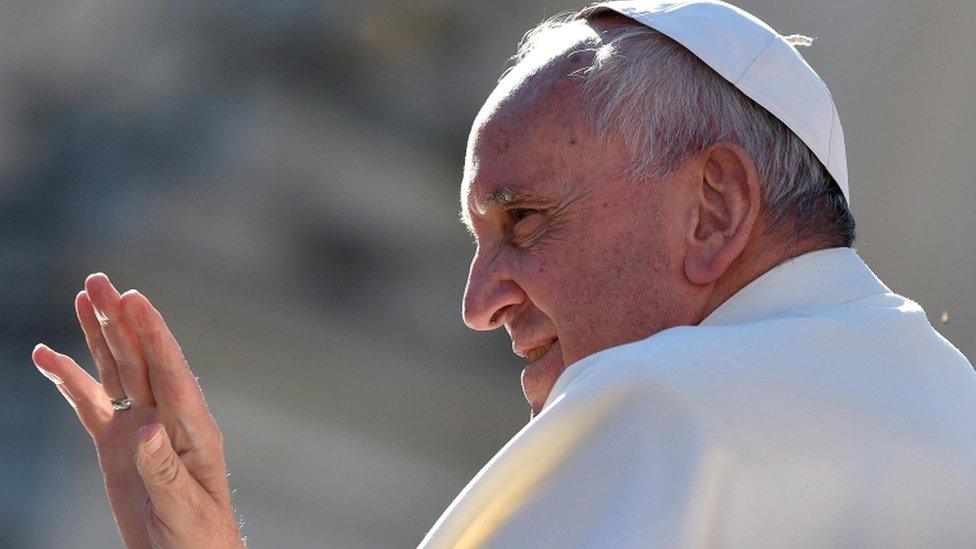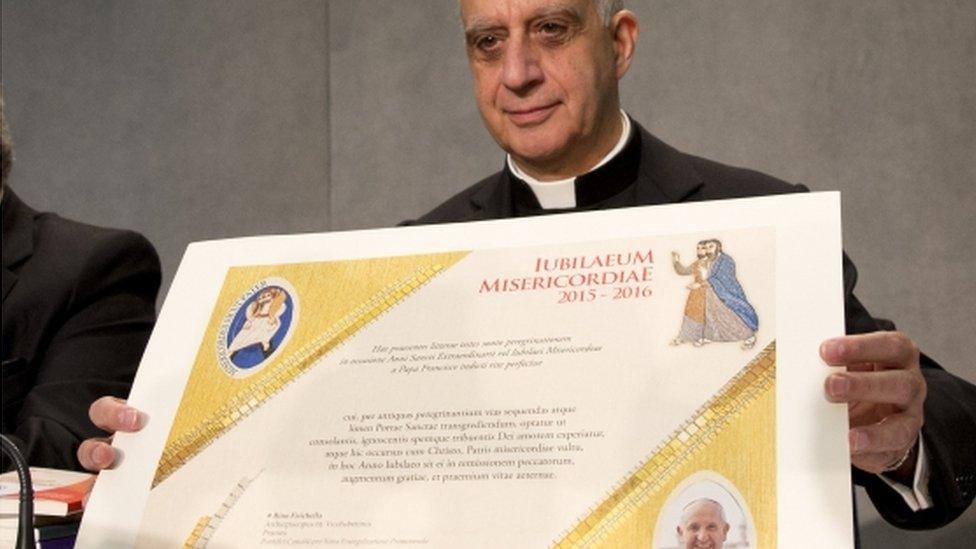What is the Catholic Year of Mercy?
- Published
- comments

Pope Francis wants Catholics to show compassion
Appropriately for the weeks of Advent leading up to Christmas, carpenters and other tradespeople have been kept busy in the run-up to the Jubilee Holy Year of Mercy, installing or ensuring that the Holy Doors, due to be opened at Roman Catholic cathedrals and churches across the world, are safe and functioning.
On Tuesday, Pope Francis will open the original Holy Door at St Peter's Basilica in Rome, the first time it has been opened since the turn of the century, to mark the official start of a year laden with symbolism for Catholics across the world.
So what does it mean? The clue to the aim of the Year of Mercy is in its name: a time for the Church itself and for Catholics everywhere to show mercy and compassion, in thought and in deed, and focus on forgiveness, reconciliation and doing good in concrete ways for the needy and those on the margins of society.
The crossing of the threshold of a Holy Door is a sign of spiritual renewal, and the passage from sin to grace.
Pope Francis has long signalled his wish to change the Church's approach from condemnation of wrongdoing to a Church more forgiving of its flock, and more understanding of the difficulties faced by believers today.
This extraordinary jubilee year is a practical way of giving expression to that wish, and creating a Church that is a "field hospital", healing and binding the wounds of its flock.
Announcing the extraordinary jubilee this March, the Pope said: "The greater the sin, the greater the love the Church must express," writing that the Holy Door is a "Door of Mercy, through which anyone who enters will experience the love of God who consoles, pardons and instils hope."
Pope Francis took many by surprise when he announced earlier this year that as part of the jubilee, all parish priests across the world would be allowed to absolve repentant women who asked for forgiveness for having an abortion, even though Church teaching still terms abortion a grave sin.
Forgiveness for abortion
He has, in effect, already begun the jubilee by opening the Holy Door of the Cathedral in Bangui, capital of the Central African Republic, during his recent trip to Africa.

Certificates will be given to Catholics who make a pilgrimage on foot to the Vatican during the year
It was one of many symbolic gestures he made in a nation torn by fighting between Christians and Muslims.
The Pope has also made clear he wants this jubilee to open a year of "fervent dialogue" between Christians, Muslims and Jews, so that all who believe in a merciful God show more mercy towards one another, driving out violence, disrespect and discrimination.
He said that the Christian profession of faith in God's mercy "relates us to Judaism and Islam, both of which consider mercy to be one of God's most important attributes".
In a year marked by cruel conflicts, terrorist attacks and natural disasters across the globe, the jubilee is expected to draw millions of pilgrims to Rome, where the city authorities and the Vatican have been working together to ensure security.
Earthly technology
Italian security forces will be on high alert, while Rome has declared a no-fly zone for drones as well as regular aircraft, although Vatican officials say they had no knowledge of any specific or credible plot to attack the city or the Vatican.
While trusting in God, the Vatican has also invested in earthly technology, with visitors having to pass through metal detectors on St Peter's Square before they can enter.

Jubilee Years:
Jubilee years are rooted in the Old Testament tradition of freeing slaves and prisoners once every 50 years, a concept that died out within Judaism but was taken up by Pope Boniface VIII for the Catholic Church in 1300.
Pilgrimages to Rome were at the heart of the original jubilee years, and attracted hundreds of thousands of pilgrims to the city, many willing to pay for "indulgences" - the eradication by the Church of the spiritual debt arising from sin.
It was a tradition that not only contributed copious cash to the Vatican's coffers, but also contributed to the theological turmoil that led to the establishment of rival Protestant churches across much of northern Europe.
The last Jubilee was called by St John Paul II to mark the millennium, and this Holy Year of Mercy starts on the Feast of the Immaculate Conception on 8 December 2015 and will end on the Feast of Christ the King on 20 November 2016.

In an innovation by Pope Francis, Holy Doors will also be opened this year at cathedrals, some churches and shrines around the world for those unable to make the pilgrimage to Rome.
In England, Cardinal Vincent Nichols, the Archbishop of Westminster, will open the Holy Door at Westminster Cathedral, while Holy Doors will also be opened in Wales, Scotland and Northern Ireland, and many churches will hold special services on Sunday to mark the start of the jubilee.